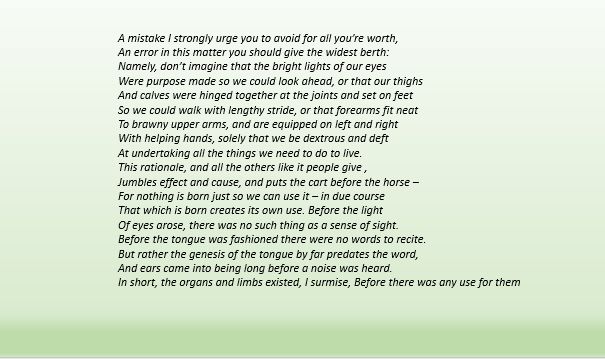

Lucretius: Book 4 line 823
 |
Page
19
|
|
Here is Lucretius expressing these ideas in Book 4 line 823 This is pure Darwinian thinking – the continual modification and
development of things that existed, honed by Natural selection . Speech
is a by-product of tongues. The tongue was not created that we might speak.
I wonder if Darwin ever read Epicurus or Lucretius. We have On the
Origin of Species in the library (4th edition 1886). These all wrote in Greek which was a language of limited spread but Lucretius
was reading them in 50BC, 300 years later, and he was a Roman writing
in Latin – a more Universal language. Epicurus was first translated
by Traversari in 1433. I think Lucretius read Epicurus from the Greek
and he developed the ideas of these early philosophers in the only book
of his which survives. This is an epic poem called De Rerum Natura
– On the nature of things . It was written in Latin in six books
or three pairs of books. The first pair dealt with atoms, the second with
the soul, and the third with the cosmos and mortality. They are
now bound in one book of 7,400 lines. His was an expositor rather than
an original thinker and his skill was in presenting difficult ideas and
putting them into verse to make them more palatable. Lucretius’ work
totally disappeared until rediscovered by Poggio Bracciolini in 1417.
Poggio was the personal secretary to John XXIII, and a prolific manuscript
hunter travelling all over Italy, Germany and Switzerland. His greatest
discovery was in a monastery in the mountains above Lake Constance. He
made a copy of De Rerum Natura and presented it to to an Italian
book collector called Niccolo Niccoli. Niccoli held the book for over
10 years whilst he translated it into Latin without allowing anybody to
see it. He did not even allow Poggio to make a copy of it. De rerum
natura was finally published in 1600 which allowed people to study
it. The Charlecote copy dates from 1675 and my copy from 1717. |